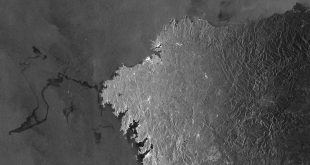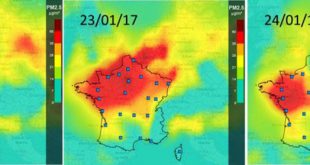Whether it is due to oil spills or cleaning out of tanks at sea, radar satellites can detect any oil slick on the ocean’s surface. Over 15 years ago, René Garello and his team from IMT Atlantique worked on the first proof of concept for this idea to monitor oil pollution from space. Today, they are continuing to work on …
Read More »Search Results for: pollution
When plants help us fight pollution
To help reduce or stabilize soil and water pollution, plants provide a rather effective yet inexpensive solution. They must be implemented on a case-by-case basis and could be used in a wide variety of sites. According to the French Environment and Energy Management Agency (Ademe), 300,000 to 400,000 industrial or mining sites in France are potentially polluted, which represents …
Read More »Fine particles are dangerous, and not just during pollution peaks
Véronique Riffault, IMT Lille Douai – Institut Mines-Télécom and François Mathé, IMT Lille Douai – Institut Mines-Télécom The French Agency for Food, Environmental and Occupational Health and Safety (ANSES) released a new notice concerning air pollution yesterday. After having been questioned on the potential changes to norms for ambient air quality, particularly concerning fine particles (PM10 and PM2.5), the organization has …
Read More »Fine particulate pollution: can we trust microsensor readings?
Nathalie Redon, IMT Lille Douai – Institut Mines-Télécom Last May, Paris City Hall launched “Pollutrack”: a fleet of micro sensors placed on the roofs of vehicles traveling throughout the capital to measure the amount of fine particles present in the air in real-time. A year before, Rennes proposed that residents participate in assessing the air quality via individual sensors. In France, for several …
Read More »Particulate matter pollution peaks: detection and prevention
By Véronique Riffault, Professor of Atmospheric Sciences, IMT Lille Douai – Institut Mines-Télécom This article was originally published in French in The Conversation France. This winter, France and a large part of Europe were struck by episodes of particulate matter pollution. These microscopic particles are known as PM2.5 and PM10 when they measure less than 2.5 or 10 micrometers …
Read More »Pollution control by constructed wetlands: An expanding French industry
The ability of wetland areas to retain and treat a wide variety of pollutants in urban and rural areas has been known about for a number of years. Understanding how they work has facilitated the creation of biofilters such as constructed wetlands. At Mines Nantes, researcher Florent Chazarenc has studied these systems over lengthy periods and created solutions adapted to …
Read More »Marine pollution as seen by ultrafast cameras
Ultrafast cameras unveil processes that are invisible to the naked eye. At Mines Alès, Pierre Slangen, a specialist in applied optics, uses them to build advanced technology devices and thus to understand how gases and liquids are diffused during environmental disasters. Certain physical phenomena occur in such small time scales that they remain practically invisible without the use …
Read More »Improving air quality with decision-making tools
Launched in October for a four-year period, the RI-URBANS project aims to strengthen synergies between European air quality monitoring networks and research infrastructures in the field of atmospheric sciences. IMT Nord Europe is a partner for this project, which received up to €8 million of funding from the European Union. Interview with Stéphane Sauvage, professor, and Thérèse Salameh, R&D engineer. European project …
Read More »Cleaning up polluted tertiary wastewater from the agri-food industry with floating wetlands
In 2018, IMT Atlantique researchers launched the FloWAT project, based on a hydroponic system of floating wetlands. It aims to reduce polluting emissions from treated wastewater into the discharge site. Claire Gérente, researcher at IMT Atlantique, has been coordinating the FloWat1 decontamination project, funded by the French National Agency for Research (ANR), since its creation. The main aim of the …
Read More »Economics – dive in, there is so much to discover!
To effectively roll out circular economy policies within a territory, companies and decision-makers require access to evaluation and simulation tools. The design of these tools, still in the research phase, necessarily requires a more detailed consideration of the impact of human activities, both locally and globally. “The circular economy enables optimization of the available resources in order to preserve them …
Read More » I'MTech L'actualité scientifique et technologique de l'IMT
I'MTech L'actualité scientifique et technologique de l'IMT









